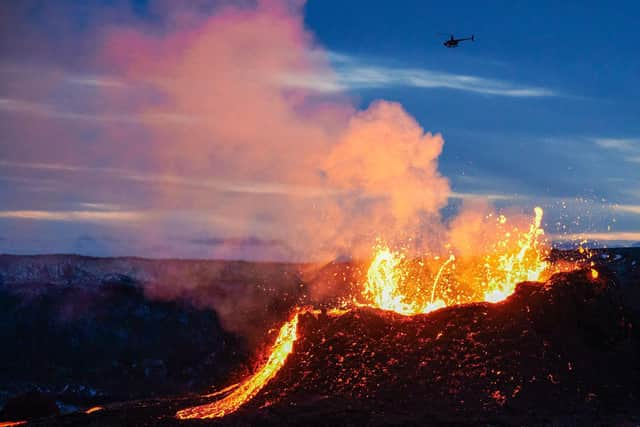Iceland volcano: Will a volcano erupt in Iceland and what will this mean for travellers? Could the volcano shut down UK and Europe air travel?
Iceland is waiting in anticipation of an eruption of a volcano in the south of the country.
Authorities have evacuated a small town and some businesses in the area are closed as a series of earthquakes hit the Reykjanes Peninsula. But how likely is it a volcano will erupt and what will that mean for locals and tourists?
What are tourists in Iceland being told?


Advertisement
Hide AdAdvertisement
Hide AdThe UK Government’s foreign travel advice for Iceland was updated at the weekend, saying people should stay away from the area in the south of the country where the seismic activity has been taking place.
"Earthquakes and indications of volcanic activity have increased above normal levels on the Reykjanes peninsula, south-west of Reykjavik,” the advice said. “The Icelandic authorities continue to monitor the area closely, particularly the area northwest of Mt Thorbjörn near the Svartsengi power plant and the Blue Lagoon.”
The advice added: “Some roads have been closed and visitors are advised to stay away from the area.”
What is happening in southern Iceland?
Magma has spread underground at a distance of more than 6.2 miles and cracks have appeared in roads in the fishing town of Grindavik, where residents have been evacuated.
Seismic activity in the region has subsided but the risk of a volcanic eruption remains significant, authorities have said. Around 900 earthquakes hit the south of the country on Monday, with the seismic activity mainly reported around the region of Reykjanes in southwestern Iceland.
On Tuesday, residents of Grindavik were allowed to briefly return to their homes after being evacuated on Friday. Many of them are staying in emergency shelters and fear their homes could be destroyed if the volcano does erupt.
Geology professor Pall Einarrson, of the University of Iceland, told Icelandic television the “magma corridor” was spreading. However, one of the problems experts face is they do not know where, when or if it will reach the surface.
"The biggest earthquakes originated there, under this old series of craters, but since then [the magma corridor] has been getting longer, went under the urban area in Grindavík and is heading even further and towards the sea," he said.
What disruption has the prospect of the eruption caused?
Advertisement
Hide AdAdvertisement
Hide AdFlights to and from Keflavik in southern Iceland – just 19 miles from Grindavik – are operating as normal.
However, the famous Blue Lagoon natural thermal pool, a regular attraction for visitors and close to the airport, is temporarily closed – at least until Thursday.
A statement from the attraction said: “The chances of a volcanic eruption on the Reykjanes Peninsula have significantly increased, initiating the precautionary evacuation of the town Grindavík to ensure the safety of residents.
“At this moment it is not possible to determine when or where an eruption might occur. The Icelandic Meteorological Office, Civil Protection and a team of scientists from the University of Iceland are closely monitoring the situation and analysing the developments.”
The statement added: “On November 9, Blue Lagoon made the pro-active decision to temporarily close its facilities, affecting operations at Blue Lagoon, Silica Hotel, Retreat Spa, Retreat Hotel, Lava, and Moss Restaurant. Considering disruptions to our guests' experience and the sustained pressure on our employees, these precautionary measures were taken to ensure safety and wellbeing for all. The closure will remain in effect until 7am on November 16, at which point the situation will be reassessed.”
Has a volcanic eruption like this happened before?
Volcanic activity in Iceland is common. There have been three eruptions on the Reykjanes Peninsula in the past two years alone and Icelandic geoscientists have vast experience in dealing with volcanic activities.
However, some previous eruptions have caused problems for travellers.
In 2010, the Eyjafjallajökull volcano erupted sporadically between March and June. In April, the eruption created an ash cloud that led to the closure of most of the European airspace, in the biggest disruption to air travel in the region since World War Two. More than 100,000 flights were cancelled over an eight-day period and many passengers stranded.
A year later, ash from the Grímsvötn volcano also closed Icelandic airspace, with airlines also forced to cancel hundreds of flights to and from Scotland.
Comments
Want to join the conversation? Please or to comment on this article.
